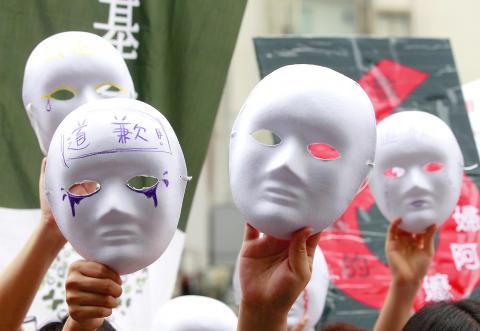Rights advocacy groups demonstrated outside the Japanese representative office in Taipei yesterday morning as part of globally coordinated action to demand that the Japanese government apologize and pay compensation to those forced to serve as military comfort women during World War II.
Holding placards condemning Japanese politicians — including Japanese Prime Minister Shinzo Abe, Deputy Prime Minister Taro Aso, Okasa Mayor Toru Hashimoto and Representative Shintaro Ishihara — for denying or playing down the comfort women issue, more than 100 demonstrators joined their partners in the US, Canada, Germany, South Korea, the Philippines and Japan in demanding that the Japanese government apologize and compensate women forced to serve in military brothels during World War II.
“We are here — as we have been in past years — to demand that the Japanese government formally apologize to and compensate comfort women,” Taipei Women’s Rescue Foundation executive director Kang Shu-hua (康淑華) said. “The Japanese government is both legally and morally responsible for the sexual exploitation.”

Photo: Pichi Chuang, Reuters
Kang said that as many as 2,000 Taiwanese women were forced to work in Japanese military brothels and that there are only six left alive — one of them is 92 years old, while the others are in their 80s.
“They have waited for all these years for an apology, how long do they still have to wait?” she asked.
Taiwan Women’s Link president Huang Sue-ying (黃淑英) said that forcing the women to suffer sexual exploitation and abuse was a war crime.
“You [the Japanese government] are wrong if you think the injustice will be buried with these former comfort women when they are all gone,” Huang said. “Generations of Taiwanese will continue to fight for justice for them, as long as we are still around.”
Labor Rights Association chairwoman Wang Chuan-ping (王娟萍) accused Japanese politicians who twist history of being accomplices in a war crime.
An official from the Japan Interchange Association’s General Affairs Department came out to receive the petition, but demonstrators questioned the sincerity of the office as it sent a lower-ranking official to receive the petition.
With the crowd chanting “apologize” and “representative, come out,” the association eventually sent Deputy Representative Yukuke Sami to receive the petition.
Three demands were listed in the petition — that the Japanese prime minister apologize to the comfort women on behalf of the Japanese government, with an endorsement from parliament; the Japanese government should recognize the fact that there were comfort women who were forced to work at military brothels and should never change its stance on the issue; and that Japan should have legislation prohibiting remarks that twist the facts about the comfort women.
The crowd vowed to return next year if the Japanese government fails to respond positively to the demands.

Chinese Nationalist Party (KMT) Chairman Eric Chu (朱立倫), spokeswoman Yang Chih-yu (楊智伃) and Legislator Hsieh Lung-chieh (謝龍介) would be summoned by police for questioning for leading an illegal assembly on Thursday evening last week, Minister of the Interior Liu Shyh-fang (劉世芳) said today. The three KMT officials led an assembly outside the Taipei City Prosecutors’ Office, a restricted area where public assembly is not allowed, protesting the questioning of several KMT staff and searches of KMT headquarters and offices in a recall petition forgery case. Chu, Yang and Hsieh are all suspected of contravening the Assembly and Parade Act (集會遊行法) by holding

PRAISE: Japanese visitor Takashi Kubota said the Taiwanese temple architecture images showcased in the AI Art Gallery were the most impressive displays he saw Taiwan does not have an official pavilion at the World Expo in Osaka, Japan, because of its diplomatic predicament, but the government-backed Tech World pavilion is drawing interest with its unique recreations of works by Taiwanese artists. The pavilion features an artificial intelligence (AI)-based art gallery showcasing works of famous Taiwanese artists from the Japanese colonial period using innovative technologies. Among its main simulated displays are Eastern gouache paintings by Chen Chin (陳進), Lin Yu-shan (林玉山) and Kuo Hsueh-hu (郭雪湖), who were the three young Taiwanese painters selected for the East Asian Painting exhibition in 1927. Gouache is a water-based

Taiwan would welcome the return of Honduras as a diplomatic ally if its next president decides to make such a move, Minister of Foreign Affairs Lin Chia-lung (林佳龍) said yesterday. “Of course, we would welcome Honduras if they want to restore diplomatic ties with Taiwan after their elections,” Lin said at a meeting of the legislature’s Foreign Affairs and National Defense Committee, when asked to comment on statements made by two of the three Honduran presidential candidates during the presidential campaign in the Central American country. Taiwan is paying close attention to the region as a whole in the wake of a

OFF-TARGET: More than 30,000 participants were expected to take part in the Games next month, but only 6,550 foreign and 19,400 Taiwanese athletes have registered Taipei city councilors yesterday blasted the organizers of next month’s World Masters Games over sudden timetable and venue changes, which they said have caused thousands of participants to back out of the international sporting event, among other organizational issues. They also cited visa delays and political interference by China as reasons many foreign athletes are requesting refunds for the event, to be held from May 17 to 30. Jointly organized by the Taipei and New Taipei City governments, the games have been rocked by numerous controversies since preparations began in 2020. Taipei City Councilor Lin Yen-feng (林延鳳) said yesterday that new measures by